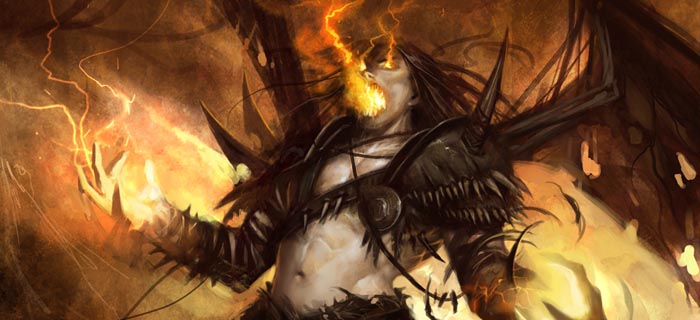How to Get Into Paper Magic: a guide for Duels players [part 1]
Wizards has been bringing Magic: The Gathering to the general public in a very accessible way for three years now with its Duels of the Planeswalkers series. If you’ve been at all curious about transferring over from that to paper Magic and experiencing the game in all its glory, this article is for you.
First thing’s first: if you are curious, I say do it! Magic is as about as deep as it ever was today, but is more enjoyable and accessible than ever, too, and has a great community behind it that’s often eager to help you on your way, and even to make friends with you.
While Duels is great as a cheap, casual way to kill time now and then, if you find yourself wanting a little more out of it, paper Magic will more than feed that itch.
The key difference and main appeal in paper Magic is of course deck building. While the de facto format — Standard — inevitably finds itself with a series of popular archetype decks (much like the different types you see in Duels), even there you’ll find quite a bit more room for your own personal deck that comes completely out of left field, if you’re the individualistic and/or expressive type. To illustrate, many players are running Delver and Zombies right now, but there’s the option to run a land destruction deck with no direct land destruction (you actually turn lands into artifacts, then use artifact destruction cards to accomplish the goal). If you’re not competitive, though, and just want to play some casual games with friends (or hell, if you want to do both), you open up the card pool to over 10,000 choices. From this you can make damn near anything, whether it’s a straight up green ramp deck or something weird like a deck with no lands or a deck that wins on turn 1 (if you’re really lucky), or a million other things.
Finding a place to play
Either way, the first step is to use Wizards’ Store Locator to find your local game shop (LGS) of choice, then head over to check out their collection, ask questions, meet some folks, and sign up for the next Draft event (more on that in a moment). Generally you want to go with a shop that has the “Wizards’ Play Network” symbol, as these offer official events and prizes; it also means they’re more likely to be legitimate and run a quality operation, which can be hard to find sometimes.
Draft is the best bet for a new player with few or no cards; I may go in-depth on this topic at a later date, but the gist of it for now is that everyone buys three boosters each ($15 total), picks a card from each pack, then passes it to the next person, and on and on it goes until all cards are distributed and all players have made a relatively focused 40-card deck based on the cards available. While it may seem odd and not like much upon first hearing about it, it’s actually the favourite format of many, and for good reason: doing a lot with a little and proving your deckbuilding skills through Draft wins can be greatly satisfying.
You keep your Draft cards, and if you place high, you receive yet more packs. It’s an efficient way to build a collection of actually usable cards (there’s a lot of jank out there), as is the ($20) Deck Builder’s Toolkit for similar reasons. Once you’ve drafted a few times and have a Toolkit handy, you should be reasonably set to build a budget deck (like mine) that will do reasonably well at Standard events (which require 60-card decks made up of recent cards only), and casual games.
Get your wallet ready
If you want to take it to the next level (which isn’t required, but can be rewarding), you can flesh out the deck by replacing some cheaper, less effective cards with more expensive “bombs” (Sublime Archangel in an Exalted deck, for one example). Do this by buying or trading for “singles” (individual cards) — going with boosters and hoping to pull the cards you need is a great way to lose a ton of money, though cracking a few packs now and then is thrilling, and doesn’t hurt your wallet much.
Another route in is to buy a $20-$25 Event Deck. These come out a few weeks after a new “set” is released (sets are analgous to Duels expansions) and are pre-made decks which instantly make you competitive — not as competitive as making your own and optimizing the crap out of it, mind you, but competitive enough. Event Decks are not to be confused with Intro Decks, which are meant for casual play with a friend who’s also interested in learning the game, for example (also an acceptable way to go). Whatever you pick, just know you’ll want to scour Gatherer to help make the deck even better. Of course, the more you play, the more you’ll learn the deck’s strengths and weaknesses, and what it needs and doesn’t need.
That’s all for now. In the second part to this article (coming soon), I’ll go over the key differences and similarities between Duels 2013 and paper Magic, so you don’t make too many silly mistakes at your first events.

![How to Get Into Paper Magic: a guide for Duels players [part 1]](https://www.toptiertactics.com/wp-content/uploads/2012/10/paper-magic-the-gathering-deck-builders-toolkit.jpg)





If i buy an event deck like the Return to ravnica (the one the internets has been excited about for the past few weeks) is that complete? Like would I have workable decks in there or am I going to find out I need to buy a starter deck builderv toolkit thing to get lands and idk basic things.
sorry if this is really vague, Im really enjoying the game and want to get into it more
Yes, it’s complete. It even includes a sideboard (15 cards you can swap in between matches, so you have a better chance against a given kind of deck). Here is exactly what you get with the RTR decks: http://www.wizards.com/Magic/Magazine/Article.aspx?x=mtg/daily/arcana/1071
No problem. Happy to help.
I honestly love that you made this article. I have been meaning to start playing paper magic, but since I only know a friend of a friend who actually plays paper magic, I have been kinda hung up on the idea.
Will first wait for your next article before going out into the real world. My computer feels a lot safer still :)
Thanks! One person goes a long way, but you don’t even need that. The first time going in the shop is the hard part, but you should feel comfortable in almost no time at all. Well worth it!
I have been playing paper a bit. I own about 2000 cards but due to the fact that it is hard to find a community in my town I didn’t stick to it.
Paper-MTG is just fun as hell though, I’d love to find some people to play with! :(
What I love about DOTP is that you don’t have to fucking shuffle your library every fucking time; and due to the limited deck-design in DOTP you can build more generally efficient decks than in paper.
Both, Paper and DOTP, have their advantages and disadvantages.
You may want to try the official meetup/playgroup forum here http://community.wizards.com/go/forum/view/75850/135178/TCG_Gamer_Classifieds It’s how I found my playgroup, which has been very fun and introduced me to some great people. Alternately you could try Craigslist or whatever other listing service is popular in your area and look for a playgroup there or try to start one yourself.
They definitely have upsides and downsides; overall I find the upsides of paper far outweigh the downsides.
I’ve been playing paper magic a lot, and agree with everything Destricted says, but I have to say I’ve also enjoyed MTGO a lot as well.
Are you going to an article on MTGO anytime soon?
I’ve tried it but can’t stand the UI (even the new one). Plus, I’d rather just put my money into paper.
I agree with Destricted on almost everything.
Drafting, once you get to the point that you don’t 100% suck, is the most cost-efficient way to get cards, learn the game, and interact with people. And if you pull something expensive or win 1st/2nd prize, it pays for itself.
I also don’t really like MTGO. In principle it’s cool, but the interface is TERRIBLE. I had heard rumors that Stainless was making a new version of MTGO that would look more like Duels, but it doesn’t seem that has panned out.
Actually building decks is fun, as long as the people around you are in the same mindset. If you’re building casual decks and they’re super serious pros, you’re gonna have a bad time. The inverse is also true.
Yeah, you can’t actually do the little Liquidmetal Coating/destroy lands thing anymore, since Scars rotated last week.
Darn it, don’t make it sound like so much fun. I have barely any time and income to spare either way! According to the shopfinder, there’s a pretty big one in the closest city, half an hour by public transport, but still, something is keeping me back from doing it. There’s also something pushing me towards it, though. I’ve always been kind of fascinated by magic since my brothers got into it, allowing me to play with copies of their decks, though I was obviously terrible. The cards I still have lying around have a sword-thingy watermark on them, I’m sure Wing will know the exact era.
Anyway, I just feel like it wouldn’t be much worth the effort (and especially money) pumped into it. And I have this phobia of going into Draft, devising a deck plan like GB, and then finding only White cards in the second half of the boosters. That’s a completely irrational fear though, right? Any strategy on how to not get owned in the deck building phase already, perhaps?
I wasn’t sure either, but for me at least, it’s actually been the best thing I’ve done in years — it keeps me social, busy, and creative, and of course it’s very fun. Absolutely it is worth the money, though I can only speak for myself for certain.
Regarding Draft, the basic key to it is to leave yourself open in pack one, and by the start or middle of pack two, have a definitive plan. Besides that, you’ll never really be screwed since everyone is leaning toward two colours most of the Draft, so you’re all bound to find a nice bit of cards in your colours. The other big tip is to have about 2/3 creatures and 1/3 removal, and make sure as many of those creatures have evasion (flying, unblockable, etc) as possible. In both Constructed and Draft formats, synergy and consistency are extremely important (moreso in Constructed, of course).
[…] of the Planeswalkers players curious about getting into paper Magic, so if you missed that, head here first, as I’ll be referencing a lot of information in from it […]
[…] Designer at Wizards of the Coast, so he was the perfect person to shed some light on the process of translating paper Magic to the popular Duels […]
[…] Start Playing Paper Magic […]
[…] Start Playing Paper Magic […]
[…] Start Playing Paper Magic […]
[…] Start Playing Paper Magic […]